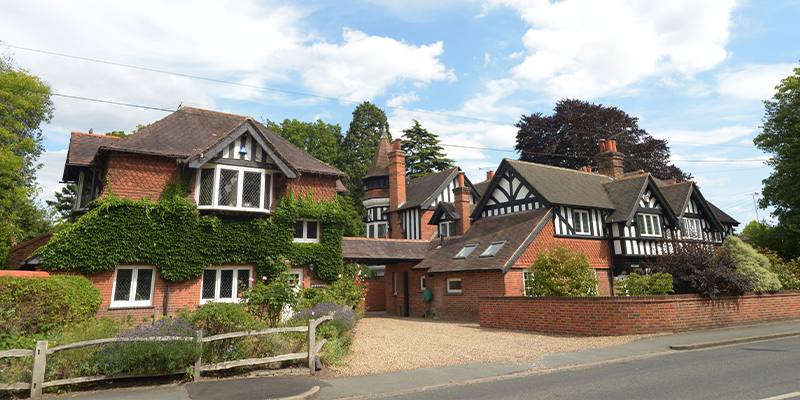When Should I Contact a Mortgage Broker?

Getting onto the property ladder in the UK can be extremely frustrating and many people find that simply getting a good mortgage deal is an uphill battle.
With property prices and interest rates increasing and wages stagnating many feel that getting a mortgage in the current market is daunting to say the least.
The good news is that lenders are still keen to lend to those looking to buy a home. The bad news is that it can be tricky to find the right lender for your circumstances.
A mortgage broker will provide a complete service that helps you get the mortgage you need to buy your dream home. Let’s explore what a mortgage broker can do for you it might surprise you!
What Does a Mortgage Broker Do?
In simple terms, a mortgage broker will find out about your current situation and then compare mortgage deals on the market that are suitable for you.
Once they have looked at the market, they will make a recommendation and provide you with an overview of the product they think suits you best.
There are a couple of caveats though some brokers charge substantial fees for their service, and some only have access to a limited panel of lenders which means that ultimately the advice could be costly, and you might not be offered the best mortgage available on the entire market.
Mortgage Broker Fees
A mortgage broker will get paid a commission by any lender that they place business with. For example, if a broker recommends a Santander product, they will pay a percentage of the loan sum to the broker for arranging the mortgage.

These commissions are broadly the same across all lenders, so you won’t need to worry about a broker placing you with an unfavourable lender just to earn more commission.
Because mortgage commissions are normally quite small sums, many brokers feel the need to charge an additional fee for their services called a mortgage broker fee.
Some brokers charge extremely large fees and we have seen fees as high as £2000 in the UK.
Boon Brokers does not charge a broker fee. Our advice is FREE and has no obligation to take a mortgage with us.
Restricted Panels vs Whole of Market
You’ll probably be surprised to learn that a large portion of mortgage brokers in the UK only have access to a select panel of lenders.
This is for a number of reasons but most commonly it is because a broker does not have direct authorisation with the FCA and instead uses a panel of lenders available by being a member of a mortgage club/ network.
This means brokers might offer the best deal available to them, but not the best deal available on the whole market.
Boon Brokers is directly authorised by the FCA and has whole of market access to lenders in the UK.
Other Broker Services
A good mortgage broker will offer everything you need for a streamlined property buying experience.
They will give advice and complete the mortgage application for you as well as arrange your life insurance and home insurance.
For further information about life insurance and home insurance we have dedicated sections below.
Free consultations are available in the UK.
Get Started NowAt What Point Should I Contact a Mortgage Broker?
You can contact a mortgage broker at any point if you have questions or queries around getting a mortgage, life insurance or home insurance.

Bear in mind if you opt to use a broker other than Boon Brokers you could find that you’re charged for the advice you receive.
For the Initial Consultation
Most buyers will find this is their first point of contact with a mortgage broker.
You will be able to discuss your goals with the broker and inform them of your current financial situation.
Typically, a broker will complete what is known as a fact find at this point which is a questionnaire that asks for your income, expenditure, type of property you’re looking to buy and other personal information that is requested by the lender.
The fact find itself will be an in depth look at your finances and life in general. It enables the broker to get an accurate snapshot of your situation and then provide bespoke advice that is tailored to your needs.
When you have completed the fact-find, the broker will review your information and explore the products available to you.
This can be a quite complex process as it is often the case that clients have requirements that need a careful search of lenders’ criteria.
At the end of the process a broker will make a recommendation after finding a lender that has criteria that fits your situation.
It is normally the case that a few lenders will be suitable, and a broker will look at the deals offered and provide the best deal for you as a quote.
For Budgeting and Deposit Advice
Both budgeting and deposits can be a huge stumbling block for buyers. There might be costs you haven’t factored in or sums that you aren’t aware of how much to put aside.
Deposits You will need at a minimum 5% of the property value set aside for the deposit.
The larger your deposit sum, the greater your chances are of accessing a lower interest rate.

Stamp Duty This can catch you out and many buyers find stamp duty costs exceed their expectations.
Second homes for example have a higher rate of stamp duty and even if you’re selling the first property, if you own the second home at the same time as the first one, the second tier stamp duty rate applies.
Stamp Duty Land Tax rates are based on the purchase price.
First time buyers get stamp duty relief, but this is often mistaken by buyers thinking they don’t need to pay stamp duty if they’re a first-time buyer. The relief only covers property up to a purchase price of £300,000 and if you buy a property at a higher price value, you’ll pay stamp duty.
Lender Fees Lenders charge an arrangement fee for you to take out a mortgage. In most cases you can opt to pay this upfront or add it to the total mortgage balance.
Remember if you add it to the mortgage balance it will incur interest.
Conveyancing Fees Lenders will typically include estimated conveyancing fees within the mortgage illustration, but you may opt to use a local conveyancer.
Conveyancers will normally need to be authorised by the lender and be an approved conveyancer on their panel.
Fees for conveyancers vary widely, and you might need to pay additional amounts to your conveyancer if you want to have searches conducted above and beyond those required by the lender.
Survey Fees Buying a house is a significant financial commitment and lenders will conduct a basic survey to check that the property value meets their mortgage criteria.
It is probably a good idea for you to conduct a more detailed survey to find out if the property has any structural problems as this can prevent you from buying a property that costs you a fortune in the long run.
All the fees mentioned will be different for everyone and you might find it confusing to work out how much money you will need upfront.
Discuss your goals with Boon Brokers and we will be able to advise you of what fees and costs to budget for and help with deposit advice.
We will also be able to give you a monthly cost of a mortgage product after completing the fact find so you can budget long term.
What Our Clients Have To Say
For Obtaining a Mortgage in Principle/Decision in Principle
Once you have got all your budgeting and deposit sorted you can apply to your recommended lender for a Mortgage in Principle (sometimes known as a Decision in Principle).

This is an informal confirmation that subject to a full mortgage application a lender will offer the amount of borrowing you require.
The Mortgage in Principle isn’t set in stone and once one is provided, a lender isn’t obliged to lend to you.
It should be treated as an indication that the lender will likely give you a mortgage.
You can use the Mortgage in Principle to show sellers and estate agents that you have the financial means to make an offer on a property.
Sometimes a Mortgage in Principle isn’t needed to make an offer, but the majority of estate agents do request one if you make an offer.
To get a Mortgage in Principle a lender will conduct a credit check.
The credit check is usually what’s known as a soft check (a search that doesn’t show up on your credit record) but sometimes lenders do a hard check (a search that shows on your credit record).
Three or more hard credit checks in a short space of time can negatively affect your credit score so make sure you ask your broker what type of check the lender will be conducting.
The last thing you want is to register three hard checks for Mortgage in Principles that prevent you from borrowing the actual mortgage.
If You Have Complex or Unique Borrowing Requirements
Some buyers have very complex personal situations that require more detailed advice.
For example, if you’re self-employed or a company director you may wonder how a lender calculates your income and what you need to provide to get a mortgage.
All lenders treat self-employed and company director income in different ways.
Some require multiple Tax Calculations & Tax Year Overviews that cover a number of years and others will only ask for your latest trading year.
Some lenders even allow company directors to use company accounts which is especially handy if you’re a director that opts to keep your income in the company rather than take salary and dividends.
At Boon Brokers we have extensive experience helping self employed people and company directors get their desired mortgage, so if you’re worried about demonstrating your income contact us for advice.
Bad/Poor Credit
Mortgages work differently to personal finance agreements because there’s an asset (property) attached to the amount you borrow.

Some lenders decline poor or bad credit borrowers because they feel they pose too high a risk.
The great news is that there are lenders available that aren’t as risk adverse and offer mortgages if your credit history isn’t ideal.
Contact Boon Brokers if you are struggling to get a mortgage or are concerned about your credit history, and we can advise you on your options.
Free consultations are available in the UK.
Get Started NowWhat Can a Mortgage Broker Help With?
Being an whole of market mortgage broker is multi-disciplined and you will find that a good mortgage broker can offer a complete service for your mortgage and property buying requirements.
Mortgage Applications
Primarily a mortgage broker will work to get the mortgage arranged for you.
They will complete the fact find and provide a Mortgage in Principle.
When you’re ready to proceed further they will complete the full mortgage application. Once the application is submitted a good broker will also chase lenders and solicitors to alleviate your stress and ensure the purchase goes smoothly.
Life Insurance
Life insurance is often overlooked but it is without doubt one of the most important safeguards to consider when buying a property. A mortgage broker can arrange and advise on life insurance and critical illness cover.
Life insurance and critical illness cover is designed to cover the mortgage in the event you pass away or get a defined critical illness during the time you have the mortgage.
It is important to note that life insurance is NOT a mandatory requirement when getting a mortgage and some brokers may mislead you into thinking you NEED to arrange it.
This isn’t the case, but in most cases, having this cover is advisable.
Home Insurance
You will need to show a lender that you have buildings cover when you complete your purchase. This is required by lenders and without it, lenders are likely not to offer the mortgage.
The reason is they want to ensure that if your house suffers damage, you have insurance to rectify it and maintain the property value for the mortgage.

Contents cover is optional and NOT a mandatory requirement for a mortgage. Again, it is advisable, and you should consider covering the contents in your property.
Contents cover doesn’t benefit the lender in any way, it is designed to protect your personal possessions.
How Do I Choose the Right Mortgage Broker?
Finding a good mortgage broker can be challenging, especially with so many brokers vying for your business.
You should look for the following when you choose your broker.
- Regulated and authorised by the Financial Conduct Authority (FCA).
- Fee free or if they charge a broker fee the amount is transparently advertised.
- Preferably choose a whole of market broker but if you don’t the broker must tell you they only have access to a restricted panel.
- Offer DEFACTO rated insurance products so you can check the quality of the insurance you’re being offered.
You should avoid brokers who don’t advertise fees or disclose what type of panel they’re working with.
You should also avoid brokers that tell you that you’re obligated to buy certain products or don’t complete a full fact find to understand your situation.
Boon Brokers is regulated and authorised by the FCA we offer FREE no obligation advice and we’re a UK whole of market broker. Contact us for any questions at all about mortgages, equity release or insurance today.
Gerard BoonB.A. (Hons), CeMAP, CeRER
Gerard is a co-founder and partner of Boon Brokers. Having studied many areas of financial services at the University of Leeds, and following completion of his CeMAP and CeRER qualifications, Gerard has acquired a vast knowledge of the mortgage, insurance and equity release industry.Related Articles
- Mortgage Broker Fees
- Choosing A Mortgage Broker
- Should I Use A Broker Or Go Direct?
- How To Not Get Ripped Off By A Mortgage Broker
- What Should I Ask When Buying A House?
- How Much Deposit Do I Need For A Mortgage
- What Are Solicitor Searches?
- Advantages Of A Mortgage Broker
- The House Buying Process
- How Long Does A Mortgage Application Take?
- What Documents Are Needed For A Mortgage?
- What Proof Of Income Is Needed For A Mortgage?
 Authorised and regulated by the Financial Conduct Authority. No: 973757
Authorised and regulated by the Financial Conduct Authority. No: 973757




